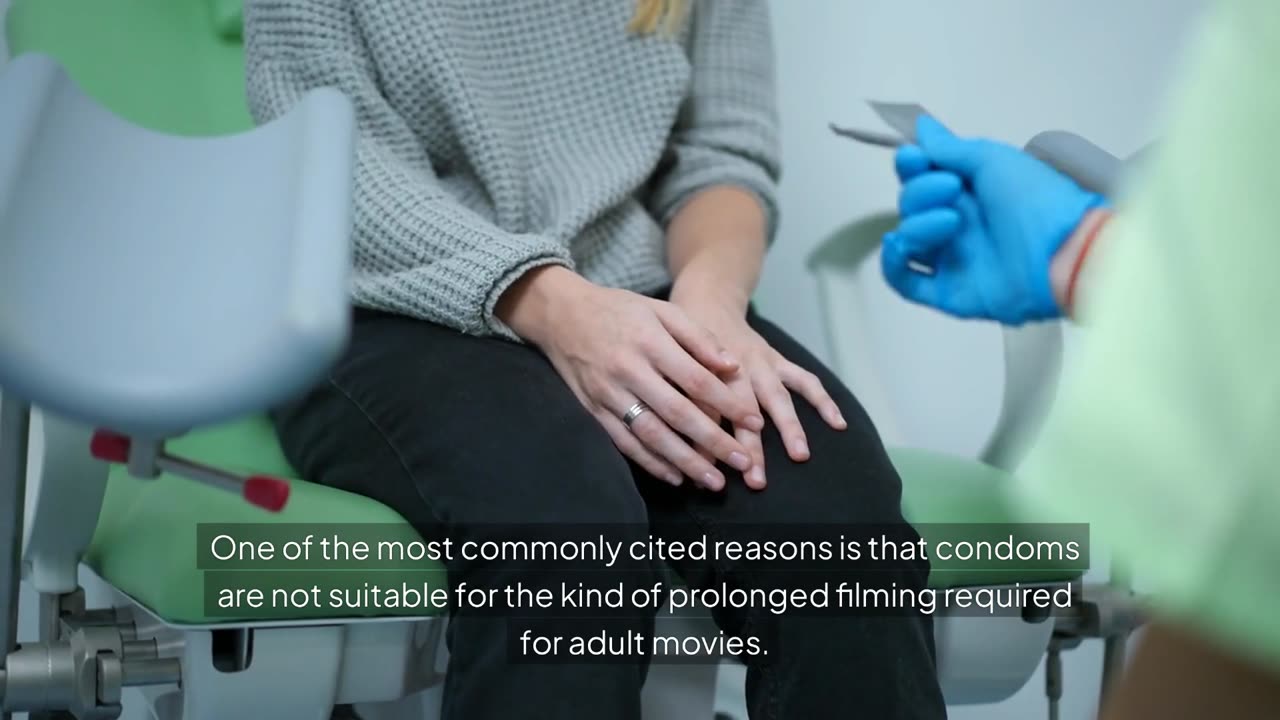Premium Only Content

The Battle Over Measure B: Condoms, Consent, and Controversy in the Adult Film Industry**
: A Law That Divides the Industry**
In November 2012, voters in Los Angeles County passed Measure B, a law mandating the use of condoms in all pornographic productions filmed within the county. The intent? To protect adult film performers from sexually transmitted infections (STIs) such as HIV. Yet, despite its good intentions, Measure B sparked a heated debate that continues to reverberate throughout the adult film industry today. Supporters argue it's a necessary health precaution, while opponents claim it’s an overreach that threatens the autonomy and livelihoods of performers.
So, what is Measure B, and why has it divided one of the world’s most controversial industries? Let’s dive into the origins, implications, and ongoing debate surrounding this contentious law.
---
### **1. What Is Measure B? Understanding the Law**
Measure B, formally known as the County of Los Angeles Safer Sex in the Adult Film Industry Act, was introduced to safeguard the health of adult film performers. The law requires the use of condoms in all vaginal and anal sex scenes filmed in Los Angeles County. Additionally, it mandates that production companies obtain a health permit and post notices to performers about condom use on set.
The idea behind Measure B stemmed from growing concerns about HIV and STI transmission within the adult film industry, particularly after several performers tested positive for HIV in 2004 and 2009. Advocates of the law, including the AIDS Healthcare Foundation (AHF), argued that mandatory condom use was an essential public health measure to protect performers.
But there was more to this measure than just condoms. Each production company must pay a fee of $1,600 every two years to obtain a permit, adding to the financial burden on smaller, independent producers. Though the law was passed with 55.9% of the vote, it has sparked ongoing litigation and backlash from performers and industry insiders alike.
---
### **2. The Arguments For: Safety First**
Supporters of Measure B, like Michael Weinstein, the president of AHF, view the law as a basic safeguard for the health of adult film performers. They argue that without such measures, performers face unnecessary risk of contracting STIs, especially HIV. The push for the law came after several high-profile cases of HIV among performers, raising alarm about the lax health protocols in the industry.
For Weinstein and others, condoms are a simple, proven method to reduce the transmission of infections. They argue that if condoms are necessary for the general public in risky sexual behavior, why should the adult film industry be an exception? According to the AHF, Measure B would prevent not only HIV but also other sexually transmitted diseases, which are common in an industry that requires frequent and often unprotected sex scenes.
From a public health perspective, the logic behind Measure B is hard to deny. Ensuring that adult film performers are safe from infections seems like a responsible course of action. However, not everyone in the industry agrees with the premise.
---
### **3. The Arguments Against: Performers’ Rights and Industry Impact**
While supporters of Measure B argue it's necessary for public health, many performers and industry professionals see it as an infringement on their rights and livelihoods. Porn performers like Kayden Kross, Ava Addams, and Ron Jeremy have publicly spoken out against the law, arguing that it imposes unnecessary restrictions on how they do their work.
Performers claim they are well aware of the risks involved in their profession and that regular STI testing—already a standard in the industry—provides a safer and more effective way to manage sexual health than condoms. In fact, many argue that condoms present their own issues. Nina Hartley, a veteran performer with a background in nursing, has highlighted the physical discomfort condoms cause during prolonged filming. She mentions that condoms can slip off, break, or cause friction burns, making them impractical for the long hours often required on set.
Beyond the physical discomfort, opponents also fear Measure B could drive the adult film industry out of Los Angeles County. Some companies have already moved production to neighboring areas or states with less restrictive regulations. The law has been criticized for threatening the local economy by potentially forcing thousands of jobs out of the county. According to industry insiders, performers may also be forced to work under less regulated conditions if production moves underground or to places with fewer protections.
---
### **4. The Legal Battles: A Fight for Control**
Since Measure B was passed, it has been the subject of multiple legal challenges. Opponents argue that the law is unconstitutional, infringing on the First Amendment rights of both performers and filmmakers. They claim that being forced to use condoms during filming restricts creative freedom and undermines their control over their own bodies.
The Free Speech Coalition, a trade group representing the adult film industry, has led much of the legal fight, arguing that adult film performers should have the right to choose how they work. They point out that the industry’s testing protocols, which require performers to be tested for STIs every 14 days, are far more effective in preventing infections than Measure B's mandatory condom use.
While the courts have largely upheld Measure B, the legal battles continue. Some industry professionals are hopeful that the law will eventually be overturned or that future legislation will focus more on testing and performer education rather than mandatory condom use.
---
### **5. Beyond Measure B: The Future of Adult Film Safety**
While Measure B has dominated the debate over performer safety in the adult film industry, it is far from the only solution being considered. Many performers advocate for an industry-led approach that emphasizes frequent testing, education, and consent over government mandates.
The industry’s current testing protocol, facilitated by organizations like the Free Speech Coalition's Performer Availability Scheduling Services (PASS), has proven effective in preventing the spread of STIs. Under this system, performers are regularly tested for a full panel of STIs, including HIV, and the results are shared with production companies to ensure that only those with clean bills of health can work on set.
Looking ahead, the future of adult film safety may lie in balancing the rights of performers with public health concerns. Ensuring performers have a voice in shaping the rules that affect them will be crucial to finding a path forward that respects both safety and personal autonomy.
---
Controversial Law with No Easy Answers**
Measure B has undoubtedly changed the landscape of the adult film industry in Los Angeles County. What was intended as a public health measure has sparked intense debate over performers’ rights, creative freedom, and the role of government regulation in a highly stigmatized industry.
As the legal battles continue and performers voice their opposition, one thing is clear: the discussion surrounding safety in adult films is far from over. While Measure B may have succeeded in raising awareness about the risks performers face, its long-term effectiveness and impact on the industry remain in question.
Thank you for reading! If you found this article insightful, please **like, share, and subscribe** to our channel for more in-depth discussions on controversial topics like this one. Let us know your thoughts in the comments—do you think Measure B is necessary, or is it government overreach? We’d love to hear from you!
-
 11:07
11:07
TimcastIRL
1 day agoElon Musk Suggests He’ll BUY MSNBC, Joe Rogan Will REPLACE Rachel Maddow
38.8K45 -
 34:24
34:24
The Rubin Report
20 hours agoFormer CEO: The Aftermath of Vice Media & What's Next for Mainstream Media | Shane Smith
58.2K16 -

tacetmort3m
1 day ago🔴 LIVE - BECOMING THE UNTOUCHABLE (RADIATION WHO?) - STALKER 2 - PART 3
17.1K4 -
 16:05
16:05
China Uncensored
16 hours agoAnother Car-Ramming Strikes Outside a Chinese School!
11.6K12 -
 9:26
9:26
Dr. Nick Zyrowski
7 hours agoAnti Inflammatory Foods | You MUST Eat These!
8.51K2 -
 15:40
15:40
Bearing
3 hours agoEnd Stage Trump Derangement | Rosie O'Donnell is NOT Doing Well 😬
9.82K48 -
 35:19
35:19
hickok45
6 hours agoSunday Shoot-a-Round # 256
18.8K25 -
 41:20
41:20
PMG
18 hours ago $0.68 earned"The No B.S. Guide to Getting Your Life together in 2024!"
11.9K -
 14:22
14:22
Forrest Galante
17 hours agoDoes The Megalodon Still Exist?
104K29 -
 26:48
26:48
Stephen Gardner
12 hours ago🔥BREAKING: Vladimir Putin JUST shocked NATO | Will only negotiate with Trump!
147K362